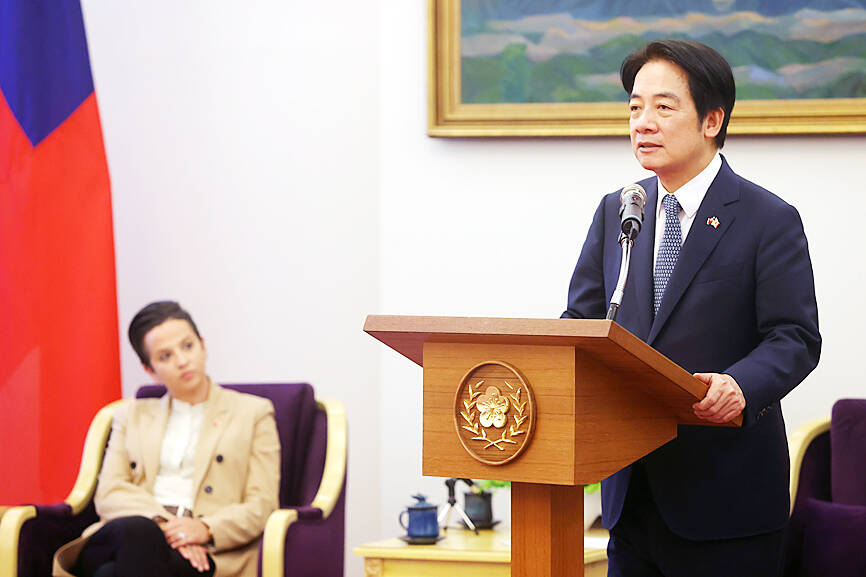Vice President William Lai (賴清德) spelled out his plan for preserving peace in the Taiwan Strait in a Wall Street Journal op-ed on Tuesday.
Lai — who is the Democratic Progressive Party’s (DPP) presidential candidate — in the article proposed four “pillars” of peace, beginning with the need for Taiwan to continue building its defense capabilities, to reduce “the risk of armed conflict by raising the stakes and the costs for Beijing.”
Expanding on the reforms made by President Tsai Ing-wen (蔡英文), Lai said he would expedite Taiwan’s transition into an asymmetric fighting force, while also focusing on civil defense, and greater cooperation with partners and allies.

Photo: CNA
The second pillar was the notion that “economic security is national security,” he wrote.
Despite Taiwan’s economic achievements, trade dependencies on China have created vulnerabilities that can be exploited through economic coercion, he said.
To ease that dependency, Taiwan must not only support its local industries, but also “foster secure supply chains while pursuing trade agreements that encourage trade diversification,” he said.
Lai stressed the importance of partnerships with democracies around the world.
The “record numbers” of visits in the past few years by think tanks, non-governmental organizations, parliamentarians and official delegations have shown Beijing that despite its pressure, Taiwan does not stand alone, he wrote.
The fourth component was a commitment to “steady and principled cross-strait leadership,” he said.
His top priorities in that area would be “pragmatism and consistency,” despite Beijing ratcheting up military and economic pressure on Taiwan, and cutting off established lines of communication, he said.
“I will support the cross-strait status quo — which is in the best interests of both the Republic of China, as Taiwan is formally known, and the international community,” he said. “I will [also] never rule out the possibility of dialogue without preconditions, based on the principles of reciprocity and dignity.”
On Monday, New Taipei City Mayor Hou You-yi (侯友宜) — the Chinese Nationalist Party’s (KMT) presidential candidate — told TVBS political talk show host Jaw Shaw-kong (趙少康) during an interview that his basic position was that cross-strait ties were of the highest priority and that stability in the Taiwan Strait would determine how military service is handled.
The cross-strait relationship has become dangerous under the DPP government and it had no choice but to extend compulsory military service to one year starting next year, Hou said.
Former Taipei mayor Ko Wen-je (柯文哲) — the Taiwan People’s Party chairman and presidential candidate — last month said that if elected president, he would restart talks on the cross-strait service trade agreement for closer economic integration with China.
Additional reporting by staff writer

MAKING WAVES: China’s maritime militia could become a nontraditional threat in war, clogging up shipping lanes to prevent US or Japanese intervention, a report said About 1,900 Chinese ships flying flags of convenience and fishing vessels that participated in China’s military exercises around Taiwan last month and in January last year have been listed for monitoring, Coast Guard Administration (CGA) Deputy Director-General Hsieh Ching-chin (謝慶欽) said yesterday. Following amendments to the Commercial Port Act (商港法) and the Law of Ships (船舶法) last month, the CGA can designate possible berthing areas or deny ports of call for vessels suspected of loitering around areas where undersea cables can be accessed, Oceans Affairs Council Minister Kuan Bi-ling (管碧玲) said. The list of suspected ships, originally 300, had risen to about

DAREDEVIL: Honnold said it had always been a dream of his to climb Taipei 101, while a Netflix producer said the skyscraper was ‘a real icon of this country’ US climber Alex Honnold yesterday took on Taiwan’s tallest building, becoming the first person to scale Taipei 101 without a rope, harness or safety net. Hundreds of spectators gathered at the base of the 101-story skyscraper to watch Honnold, 40, embark on his daredevil feat, which was also broadcast live on Netflix. Dressed in a red T-shirt and yellow custom-made climbing shoes, Honnold swiftly moved up the southeast face of the glass and steel building. At one point, he stepped onto a platform midway up to wave down at fans and onlookers who were taking photos. People watching from inside

Japan’s strategic alliance with the US would collapse if Tokyo were to turn away from a conflict in Taiwan, Japanese Prime Minister Sanae Takaichi said yesterday, but distanced herself from previous comments that suggested a possible military response in such an event. Takaichi expressed her latest views on a nationally broadcast TV program late on Monday, where an opposition party leader criticized her for igniting tensions with China with the earlier remarks. Ties between Japan and China have sunk to the worst level in years after Takaichi said in November that a hypothetical Chinese attack on Taiwan could bring about a Japanese

STREAMLINED: The dedicated funding would allow the US to transfer equipment to Taiwan when needed and order upgraded replacements for stockpiles, a source said The US House of Representatives on Thursday passed a defense appropriations bill totaling US$838.7 billion, of which US$1 billion is to be allocated to reinforcing security cooperation with Taiwan and US$150 million to replace defense articles provided to the nation. These are part of the Consolidated Appropriation Act, which the US House yesterday passed with 341 votes in favor and 88 against. The act must be passed by the US Senate before Friday next week to avoid another government shutdown. The US House Committee on Appropriations on Monday unveiled the act, saying that it allocates US$1 billion for the Taiwan Security Cooperation Initiative